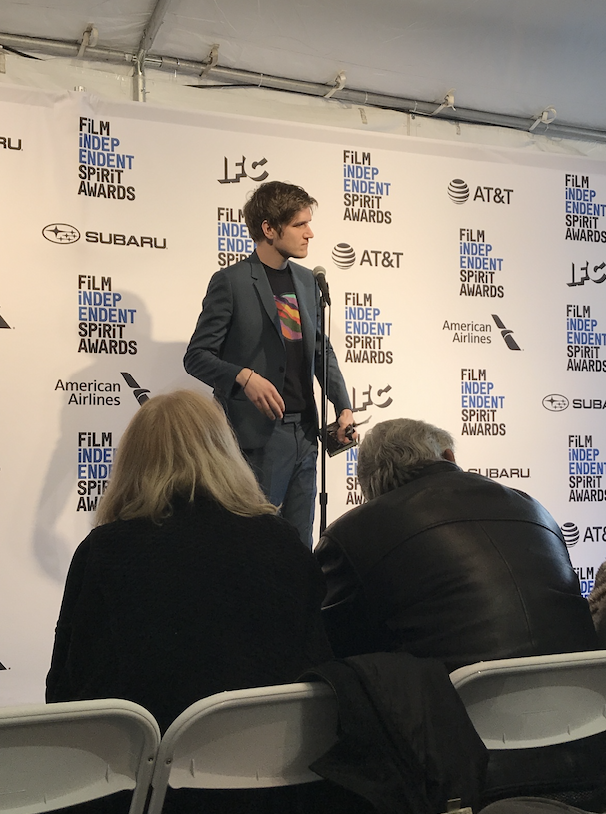Independent Spirit Awards recognizes overlooked films

Oscar Sunday is one of the biggest televised events of the year. Yet, on Saturday, 24 hours before the world turned to the Dolby Theatre in Hollywood for the Academy Awards, Film Independent held its annual Spirit Awards inside a humongous tent at Santa Monica State Beach. A tradition 34 years in the making, the show has had a reputation for recognizing oft-overlooked filmmakers before the Academy Awards acknowledge the A-listers.
While they award achievement in similar categories as the Oscars, the Spirit Awards typically reward lower-budget, auteurist cinema. The result is a ceremony that recognizes and elevates the films normally left out.
“The [independent] community is so much less mercenary,” said Bing Liu, who was nominated for the Spirit Awards’ Best Documentary category with his film “Minding the Gap,” told the Daily Trojan. “There are so many organizations like Film Independent who have helped us, who just want to support these films.”
Film Independent earned praise for its recognition of female filmmakers. The directing category alone featured three female nominees out of five directors.
“I’m very proud to say that 60 percent of our director nominees are women,” host Aubrey Plaza said in her opening monologue. “Don’t get too excited — in this case, 60 percent just means three women, but calling it 60 percent makes it sound way scarier to your uncles.”
Film Independent also gives out the Bonnie Award, a $50,000 grant to one visionary female director. This year, it was awarded to Debra Granik, who directed Best Feature nominee “Leave No Trace.”
“This award is saying ‘Keep going, nose to the grindstone. We like what you’re doing, do more’ … it’s a direct, mainline encouragement,” Granik said in her speech.
As one of the final ceremonies of awards season, the Spirit Awards ceremony also serves as a send-off to many nominees who won’t make appearances at the Oscars.
Best First Screenplay winner Bo Burnham made sure to thank his audience’s response to “Eighth Grade” in his final speech of awards season.
“To the film community, I felt so embraced by you guys,” Burnham said. “I felt really, really, really intimidated entering the film community, and I just found it to be really gracious and accepting, so thank you so much.”
Best First Screenplay and Best First Feature are some of the categories wholly unique to the Spirit Awards — the latter was awarded to Boots Riley for his first film “Sorry to Bother You.”
Riley, whose film debut deals with the intertwining of capitalism and race in modern society, spoke on how he had personally witnessed these issues in his own life growing up in Oakland.
“Growing up, I got involved in movements that showed me that all the struggles that we’re talking about are related to material things and things that we can actually change,” Riley said in his speech. “We can have power react to us … basically through organizing on the job and through having movements that use withholding of labor as a tactic or a strategy for social change.”
Toward the end of the show, Glenn Close and Ethan Hawke won the Best Female and Male Lead awards, respectively. Both are recurring Spirit Awards personalities.
“[Independent films] are not the kind of films studios are making anymore,” Close said in her acceptance speech. “It’s the kinds of stories that, I think, are incredibly important for us as human beings to try to figure out who we are, where we came from and where we’re going.”
One of the awards’ biggest winners was“If Beale Street Could Talk,” which came away with Spirit Awards for Best Supporting Female Actor (Regina King), Best Director (Barry Jenkins) and Best Feature.
Barry Jenkins, who adapted the film from James Baldwin’s novel, said the medium of independent film allows audiences to witness stories from overlooked but relevant sources, including black authors.
“James Baldwin published his book 45 years ago, and many of the things he was talking about are still very relevant today,” Jenkins said in his acceptance speech for Best Director. “I think it shows that some of these issues with mass incarceration and systemic injustice still haven’t been addressed in those 45 years.”
Although “If Beale Street Could Talk” was not considered for Best Picture at the Academy Awards, Jenkins ended the night expressing his joy at receiving his first Spirit Award.
“It’s dope because I’ll be honest, when I started making movies, I wanted to win these things.” Jenkins said in his speech. “I thought it was impossible to win [an Oscar]; somehow, through mixing of envelopes and whatnot we won. Also, you win Best Picture, and it doesn’t change the filmmaker that you are. I think being here, winning or losing, is confirmation and affirmation that we’re going to continue making things in the same way.”
A decidedly more relaxed atmosphere than the Academy Awards, the Spirit Awards fittingly book ended awards season for many independent filmmakers and performers. As well, many of these artists praised Film Independent for creating an atmosphere of inclusivity and diversity inside their Santa Monica tent. In its 34th year, the Spirit Awards held onto its clear objective of acknowledging the stories many people do not (but need to) see.

